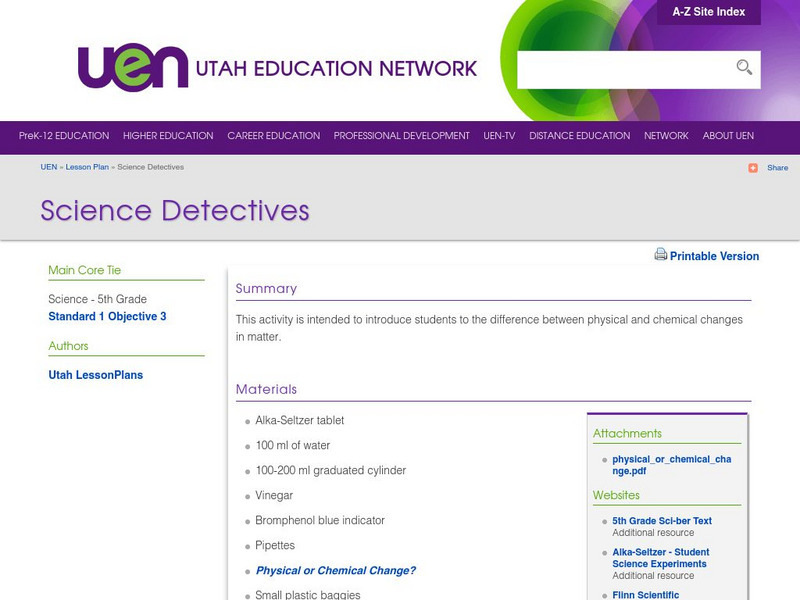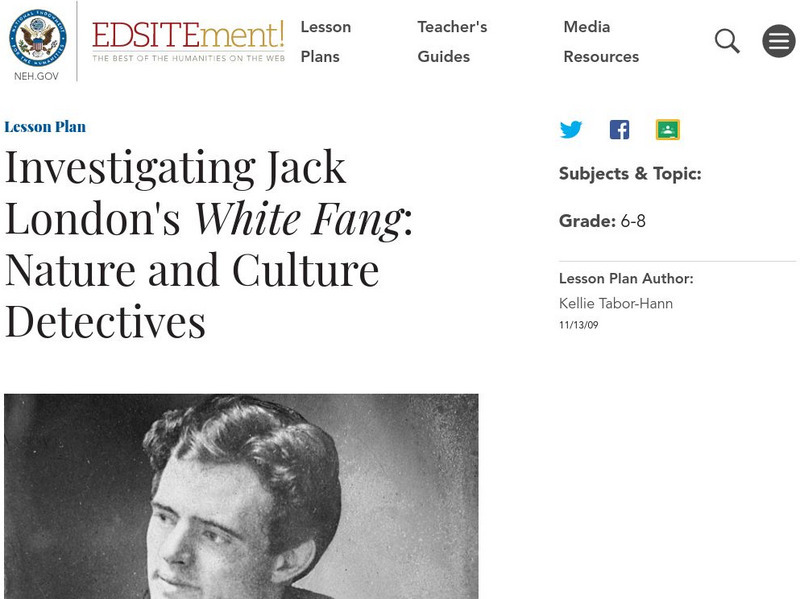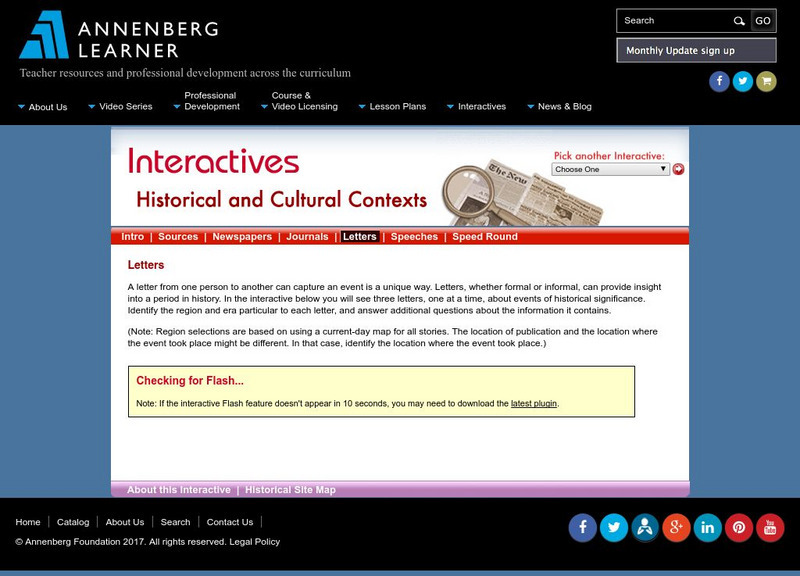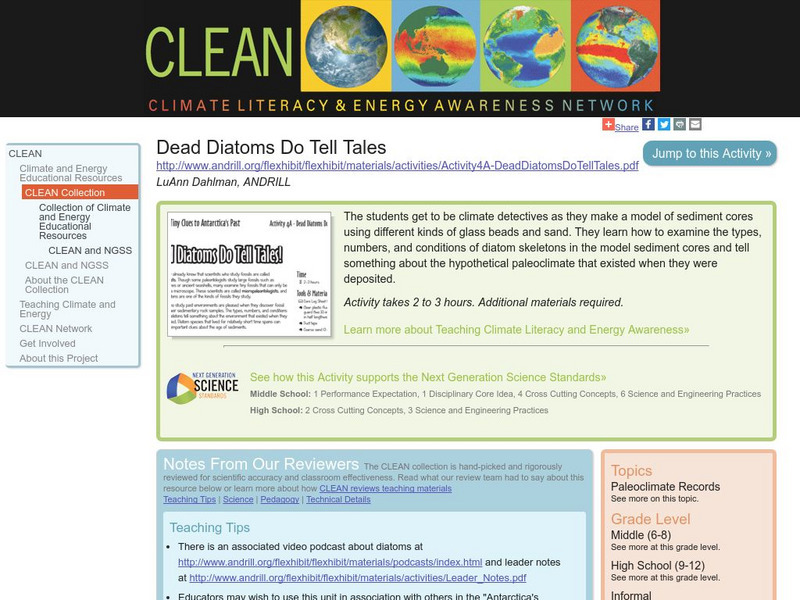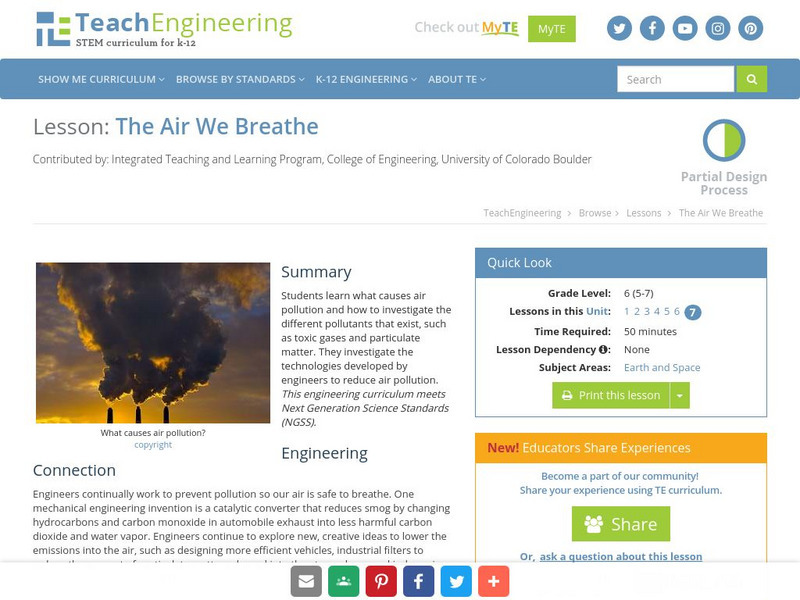PBS
Pbs: History Detectives: Investigations: Black Star Line [Pdf]
PBS had a series called "History Detectives." The video is no longer available for this episode, but this transcript of the video is. Read about the Black Star Line, envisioned by Marcus Garvey as a shipping company in which African...
PBS
Pbs: Nova: Disease Detective
As the local epidemiologist, it is your job to investigate a mysterious disease outbreak. Several people in a camping area have become sick with an unknown serious illness. Trace the outbreak to its source using the basic methods of...
Other
Historical Scene Investigation: Hsi: Antonio a Slave
Activity in which students play the role of detective and follow the life story of a slave to investigate changing slave laws and conditions in the 1600s. Through their investigation, students read and analyze the evidence in the form of...
US Department of Energy
U.s. Dept. Of Energy: Project Learning Tree: Energy Detectives [Pdf]
Investigate how energy is used throughout the day. Find out where energy is found, explore the energy around, and complete an energy journal.
Science Education Resource Center at Carleton College
Serc: Investigating Sound: Vibrations Are the Source of Sound
In this classroom activity, students will discover that when objects vibrate a sound is produced. Students will first observe different sound sources such as a music box, a sucker toy that has a stick coming out of it, etc. They will...
NOAA
Noaa: Be a Shipwreck Detective [Pdf]
Use your skills of investigation to examine a list of items recovered from a shipwreck. Draw conclusions about the ship and its demise based off of your observations.
Science Education Resource Center at Carleton College
Serc: Investigating Sound: Using Open Tubes to Demonstrate Beat Notes
In this interactive demonstration, students will observe while the teacher creates two sound frequencies using open tube resonators of nearly identical length. The nearness in length produces two slightly different frequencies which...
Utah Education Network
Uen: Science Detectives
Students are given a scenario for this lesson where they must use investigative skills like a detective would to decide whether changes that happen to objects in the story are physical or chemical. They then conduct an experiment with...
Other
Nesdis: Investigating Oceans: Algae Blooms
Explore how scientists use satellite data to detect and monitor Harmful Algal Blooms (HABs). HABs can be toxic to both humans and marine life. Students will learn how to read and interpret satellite images to better understand HAB events.
National Endowment for the Humanities
Neh: Edsit Ement: Investigating London's White Fang:nature and Culture Detectives
In this lesson plan, students will consider Investigating Jack London's White Fang: Nature and Culture Detectives. Worksheets and other supporting materials can be found under the Resources tab.
Council for Economic Education
Econ Ed Link: Be an Ad Detective
Every day, young scholars are bombarded by advertising. They cannot escape it. But marketers realize that many ypung people are becoming very good at tuning ads out. Businesses thus are becoming more creative in their communication with...
Tate
Tate Museum: The Case of the Mysterious Object; Henry Moore Sculpture
Learn about a sculpture by the British monumental figurative sculptor, Henry Moore, in this interactive investigation of a piece by Moore, which looks at every apsect of the piece from how it was made to who made it.
National Health Museum
Access Excellence: Dna Detectives
A hands-on activity from Access Excellence for advanced biology classes. Students are given a crime scenario and three suspects. Their mission is to determine 'Who Dunnit?' by obtaining and analyzing DNA samples. Requires extensive...
Annenberg Foundation
Annenberg Learner: Letters: Use Your Document Detective Skills
Read three letters, one at a time, about events of historical significance. Identify the region and era particular to each letter, and answer additional questions about the information it contains.
PBS
Pbs Learning Media: The Hound of the Baskervilles 1: Meet Sherlock Holmes
Students investigate the iconic and much-beloved character of Sherlock Holmes, as well as the mystery genre, in this excerpt from Masterpiece's 2002 version of The Hound of the Baskervilles. As students are introduced to Holmes, they use...
Cyberbee
Cyberbee: Who Dunnit?
If you are a crime scene investigation (CSI) fan, then you will love this site! You get to be the detective by examining the evidence, viewing the crime scene, dusting for fingerprints, interviewing the suspects, and solving the crime.
Federal Bureau of Investigation
Fbi Youth: Grades 6th 12th
Explore the FBI by joining agents as they investigate crimes around the world, following a case through the FBI Lab, look at a day in the life of an FBI agent, and more!
Climate Literacy
Clean: Dead Diatoms Do Tell Tales
Students take on the role of climate detectives in this climate investigation. Teams make a model of sediment cores using glass beads and sand, study the core samples, and tell something about the hypothetical paleoclimate that existed...
Council for Economic Education
Econ Ed Link: What Happened to Railroads?
Between the Civil War and World War II, railroads were one of the nation's most important businesses and an integral part of people's lives. In this lesson, students assume the role of detectives investigating why the rail companies...
Blackdog Media
Classic Reader: The Golden Scorpion by Sax Rohmer
This is the full text of the novel The Golden Scorpion by Sax Rohmer, a sequel to The Yellow Claw. Sax Rohmer's famous detectives Gaston Max and Inspector Dunbar investigate an international gang of assassins that is mysteriously linked...
TeachEngineering
Teach Engineering: The Air We Breathe
During this lesson, students will learn what causes air pollution and how to investigate the different pollutants that exist, such as toxic gases and particulate matter. Students will investigate the technologies developed by engineers...
National Institutes of Health
National Library of Medicine: Spectral Detection
This concise site provides a brief discussion of the invention of the first work spectroscopes and their impact on forensic science.
National Institutes of Health
National Library of Medicine: The Marsh Test
The Marsh Test, developed in 1832, was designed to detect poison in drinks. A short history of this test is provided along with photo of the test apparatus.
TeachEngineering
Teach Engineering: Particle Sensing: The Coulter Counter
Students are presented with a short lesson on the Coulter principle, an electronic method to detect microscopic particles and determine their concentration in fluid. Depending on the focus of study, students can investigate the...
![Pbs: History Detectives: Investigations: Black Star Line [Pdf] Activity Pbs: History Detectives: Investigations: Black Star Line [Pdf] Activity](https://content.lessonplanet.com/knovation/original/35500-5ce0e7c72f9615a7b74440d3571e2d59.jpg?1661252960)

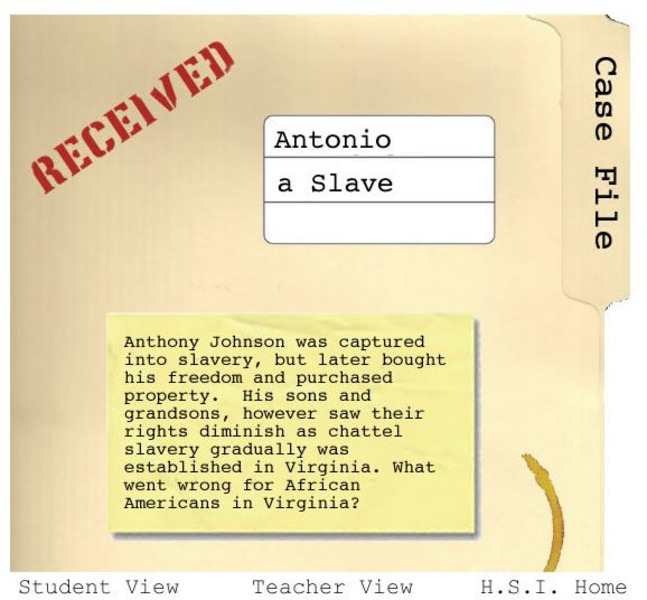
![U.s. Dept. Of Energy: Project Learning Tree: Energy Detectives [Pdf] Unit Plan U.s. Dept. Of Energy: Project Learning Tree: Energy Detectives [Pdf] Unit Plan](https://static.lp.lexp.cloud/images/attachment_defaults/resource/large/FPO-knovation.png)


